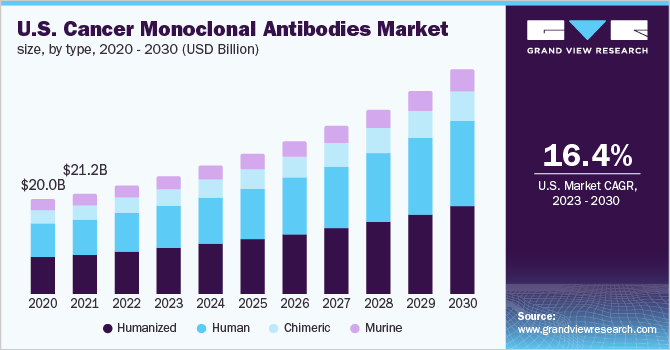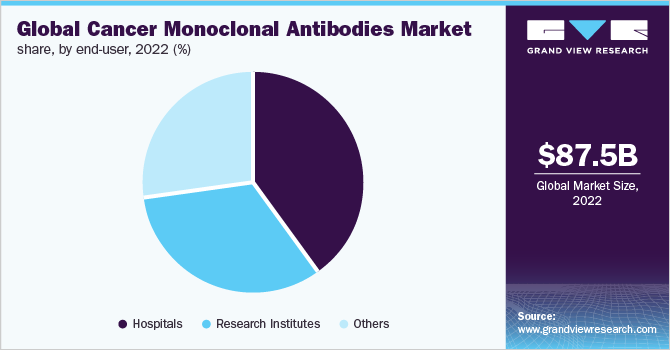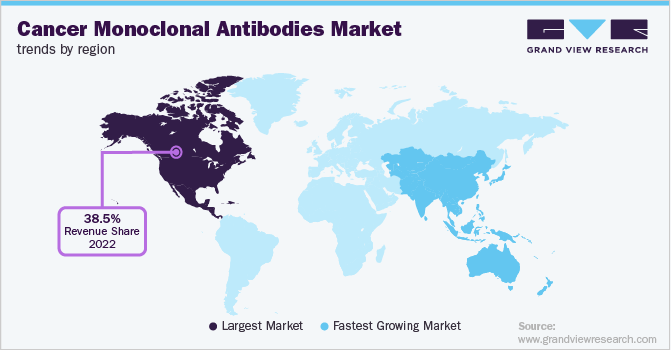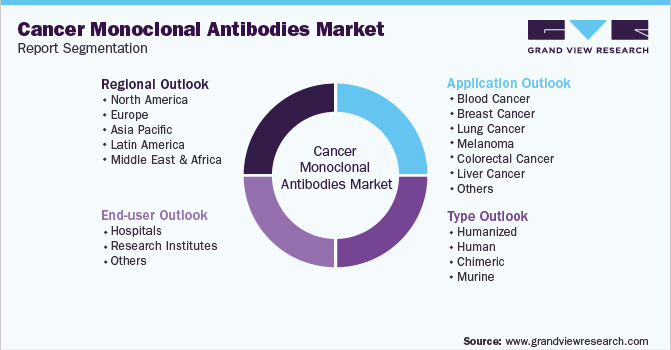- Home
- »
- Biotechnology
- »
-
Cancer Monoclonal Antibodies Market Size Report, 2030GVR Report cover
![Cancer Monoclonal Antibodies Market Size, Share & Trends Report]()
Cancer Monoclonal Antibodies Market Size, Share & Trends Analysis Report By Type (Chimeric Antibodies, Humanized Antibodies), By Application (Blood Cancer, Breast Cancer, Lung Cancer), By End-user, By Region, And Segment Forecasts, 2023 - 2030
- Report ID: GVR-4-68039-957-1
- Number of Report Pages: 135
- Format: PDF, Horizon Databook
- Historical Range: 2018 - 2021
- Forecast Period: 2023 - 2030
- Industry: Healthcare
Report Overview
The global cancer monoclonal antibodies market size was valued at USD 73.79 billion in 2022 and is expected to expand at a compound annual growth rate (CAGR) of 18.20% from 2023 to 2030. Monoclonal antibody-based immunotherapy is a major element of cancer therapy besides surgery, chemotherapy, and radiation. mAbs have been recognized as one of the utmost successful therapeutic approaches for both solid tumors and hematologic malignancies in the last 20 years. The rising prevalence of cancer and increasing drug approvals along with a robust pipeline are the key factors augmenting the market growth. Millions of people globally stand to benefit both from the current monoclonal antibody-based therapies and those that are in development.

Moreover, mAbs have reduced side effects on the patient’s body when compared to chemotherapy. Furthermore, the growing adoption of cost-efficient biosimilar mAbs by oncologists and medical practitioners will further provide a boost to the growth of the market during the forecast period. In March 2020, the WHO designated COVID-19 as a pandemic. This outbreak has considerably affected both the world and the U.S. markets. In response to the COVID-19 outbreak, governments of many cities, counties, states, and other geographic regions have taken protective or preventative actions, such as imposing restrictions. As COVID-19 reached a tipping point in the U.S. and Europe during the last two weeks of March 2020, its far-reaching consequences were observed across industries and businesses, with hospitals postponing or canceling treatment procedures for cancer and halting clinical trials.
Moreover, the reduced access to health care systems to contain the pandemic resulted in a sharp decline in cancer screening. For instance, breast cancer screening saw an 87% decline in April 2020 compared to the average for the same month over the last five years. Many cancer patients had to delay or postpone their cancer treatment, which led to concerns about timely access to cancer treatments and disease recurrence or cancellation of cancer treatments. Cancer is a class of chronic diseases categorized by uncontrolled cell growth. The increasing number of cancer cases is anticipated to increase the demand for monoclonal antibodies and propel market growth.
According to the American Society of Clinical Oncology, by the end of 2022, there will be a projected 1.9 million diagnosed cancer cases and 609,360 deaths in the U.S. In addition, estimates by the same source projected that in 2020, an estimated 176,000 people globally were diagnosed with multiple myeloma. In 2022, it is projected that more than 34,000 individuals will be diagnosed with multiple myeloma, and above 12,000 people will die in the U.S. Over the past couple of years, the US FDA has approved more than a dozen monoclonal antibodies for treating various types of cancer. As scientists have discovered more antigens connected to cancer, they have been able to develop monoclonal antibodies against several cancer types.
In addition, clinical trials of newer monoclonal antibodies are now being carried out for various types of cancer. mAbs present a huge opportunity for the treatment of cancer due to their specificity. Their use will witness increasing demand during the forecast period, as science determines more and more novel targets in cancer cells. Many types of tumors are presently being treated with these novel biological drugs. Treatment standards involving monoclonal antibodies will continue to progress and have the probability to offer therapeutic options for cancer patients in the coming years.
Type Insights
The humanized segment held the highest market share of 40.58% in 2022. Humanized monoclonal antibodies are engineered to replace the mouse-related immunogenic or epitope structures. Due to the low cost, availability, and quick production time for mouse monoclonal antibodies, the humanization of mouse monoclonal antibodies has been applied on a large scale, thereby driving the growth of the market. In addition, 50% of newly approved mAbs are humanized monoclonal antibodies.
Furthermore, innovative genetic engineering technology engaged in its production is another potential growth driver for this segment. Several humanized antibodies have now been constructed and designed, and many are at present being evaluated in clinical trials. However, the human segment is expected to be the fastest-growing segment with 18.4% CAGR over the forecast period. An increase in the number of product approvals and product launches of human mAbs will positively impact the growth of the segment during the assessment years.
Application Insights
The blood cancer segment held the highest market share of 23.94% in 2022. There has been a tremendous increase in demand for hematological disorder treatments over the last three years, which has led pharmaceutical industries to develop novel medications, including cancer monoclonal antibodies. For instance, in August 2020, the FDA approved GSK’s BLENREP for treating patients with refractory or relapsed multiple myeloma.
However, lung cancer is expected to be the fastest-growing segment with 21.2% CAGR over the forecast period. The increasing prevalence of lung cancer will drive the product demand in near future. NSCLC is the most common type of lung cancer, and it accounts for about 85% of all lung cancer cases, with more than 2 million new cases in 2020 globally. Moreover, to cater growing burden of the disease, significant market players are implementing developmental activities that will offer growth opportunities in the near future. For instance, in June 2022, FDA accepted the application for Merck’s KEYTRUDA as an Adjuvant Therapy for Stage IB-IIIA Non-Small Cell Lung Cancer after the completion of surgical resection.
End-user Insights
The hospitals segment held the highest market share of 40.14% in 2022. Some of the factors that can be attributed to the segmental share include the rising prevalence of cancer along with an upsurge in the number of patient hospitalizations. In addition, the availability of innovative drug therapies in hospitals drives patient preference. Furthermore, skilled professionals offering specialty treatments will drive the product demand in the hospitals.

Additionally, strategic activities by research organizations are going to generate lucrative growth opportunities during the review period. For instance, IRBM signed an agreement with The University of Texas MD Anderson Cancer Center in 2019. The contract focuses on the development of therapeutic mAbs against novel immune checkpoint targets. Similarly, in 2021, Celltrion Healthcare signed an agreement with the Brazilian Ministry of Health to supply two of its anticancer therapeutics - Truxima and Herzuma - to the market.
Regional Insights
North America dominated the cancer monoclonal antibodies market with a share of 38.51% in 2022. Strategic activities are key factors influencing the market growth. For instance, in September 2020, AbbVie and I-Mab signed a broad, international partnership agreement for the commercialization and development of lemzoparlimab, an advanced anti-CD47 monoclonal antibody discovered and developed by I-Mab for multiple cancers treatment. The partnership also allows for future collaboration on CD47-associated therapeutic agents.

The Asia Pacific is estimated to be the fastest-growing region with a CAGR of 22.2% owing to an increase in efforts by global firms to penetrate this emerging market to capture a higher share. An increasing number of international and national collaborations among entities, especially those in developed and developing countries, is expected to propel the market. In addition, an increase in the adoption of biosimilars in the region will further offer lucrative opportunities in the review period. For instance, in recent years, China’s biosimilar drug industry has established rapidly. By the end of 2019, the country had the maximum number of biosimilar drugs in research, with 391 biosimilar drugs in the research and development pipeline. As of December 2020, 11 biosimilar drugs had been accepted for marketing in China, comprising 6 drugs for oncology
Key Companies & Market Share Insights
A prominent number of these players are rapidly opting for geographical expansion, strategic collaborations, and partnerships through mergers and acquisitions in emerging and economically favorable regions. For instance, in March 2022, Sanofi and Seagen Inc. announced an exclusive collaboration agreement to design, develop, and commercialize antibody-drug conjugates (ADCs) for up to three cancer targets. Some of the prominent players in the global cancer monoclonal antibodies market include:
-
F. Hoffmann-La Roche Ltd.
-
Bristol Myers Squibb Co.
-
Merck & Co.
-
GlaxoSmithKline plc
-
Johnson & Johnson
-
Amgen, Inc.
-
Novartis AG
-
AstraZeneca plc
-
Eli Lilly and Company
-
AbbVie
Cancer Monoclonal Antibodies Market Report Scope
Report Attribute
Details
Market size value in 2023
USD 87.51 billion
Revenue forecast in 2030
USD 281.78 billion
Growth rate
CAGR of 18.20% from 2023 to 2030
Base year for estimation
2022
Historical data
2018 - 2021
Forecast period
2023 - 2030
Quantitative units
Revenue in USD billion and CAGR from 2023 to 2030
Report coverage
Revenue forecast, company ranking, competitive landscape, growth factors, and trends
Segments covered
Type, application, end-user, region
Regional scope
North America; Europe; Asia Pacific; Latin America; MEA
Country scope
U.S.; Canada; Germany; U.K.; France; China; Japan; India; Brazil; Mexico; South Africa; Saudi Arabia
Key companies profiled
F. Hoffmann-La Roche Ltd.; Bristol Myers Squibb Co.; Merck & Co.; GlaxoSmithKline plc; Johnson & Johnson; Amgen, Inc.; Novartis AG; AstraZeneca plc; Eli Lilly and Company; AbbVie
Customization scope
Free report customization (equivalent up to 8 analyst’s working days) with purchase. Addition or alteration to country, regional, and segment scope.
Pricing and purchase options
Avail customized purchase options to meet your exact research needs. Explore purchase options
Global Cancer Monoclonal Antibodies Market Segmentation
This report forecasts revenue growth at global, regional, and country levels and provides an analysis of the latest industry trends in each of the sub-segments from 2018 to 2030. For the purpose of this study, Grand View Research has segmented the global cancer monoclonal antibodies market report on the basis of type, application, end-user, and region.

-
Type Outlook (Revenue, USD Billion, 2018 - 2030)
-
Humanized
-
Human
-
Chimeric
-
Murine
-
-
Application Outlook (Revenue, USD Billion, 2018 - 2030)
-
Blood Cancer
-
Breast Cancer
-
Lung Cancer
-
Melanoma
-
Colorectal Cancer
-
Liver Cancer
-
Others
-
-
End-user Outlook (Revenue, USD Billion, 2018 - 2030)
-
Hospitals
-
Research Institutes
-
Others
-
-
Regional Outlook (Revenue, USD Billion, 2018 - 2030)
-
North America
-
U.S.
-
Canada
-
-
Europe
-
Germany
-
U.K.
-
France
-
-
Asia Pacific
-
Japan
-
China
-
India
-
-
Latin America
-
Brazil
-
Mexico
-
-
Middle East and Africa (MEA)
-
South Africa
-
Saudi Arabia
-
-
Frequently Asked Questions About This Report
b. The global cancer monoclonal antibodies market size was estimated at USD 73.79 billion in 2022 and is expected to reach USD 87.51 billion in 2023.
b. The global cancer monoclonal antibodies market is expected to witness a compound annual growth rate of 18.2% from 2023 to 2030 to reach USD 281.78 billion in 2030.
b. The Humanized segment held the highest market share of 40.58% in 2022. Humanized monoclonal antibodies are engineered to replace the mouse-related immunogenic or epitopes structures. Due to the low cost, availability, and quick production time for mouse monoclonal antibodies, the humanization of mouse monoclonal antibodies has been applied on a large scale, thereby driving the growth of the market.
b. Key players competing in the cancer monoclonal antibodies market include F. Hoffmann-La Roche Ltd, Bristol Myers Squibb Co., Merck & Co, GlaxoSmithKline plc, Johnson & Johnson, Amgen, Inc., Novartis AG, AstraZeneca plc, Eli Lilly, and AbbVie.
b. Increasing prevalence of cancer, and product approvals along with a robust pipeline are the key factors augmenting the cancer monoclonal antibodies market growth. Furthermore, the booming biosimilar market will further offer lucrative opportunities in the study period.
Share this report with your colleague or friend.
![gvr icn]()
NEED A CUSTOM REPORT?
We can customize every report - free of charge - including purchasing stand-alone sections or country-level reports, as well as offer affordable discounts for start-ups & universities. Contact us now
![Certified Icon]()
We are GDPR and CCPA compliant! Your transaction & personal information is safe and secure. For more details, please read our privacy policy.
We are committed towards customer satisfaction, and quality service.
"The quality of research they have done for us has been excellent."





